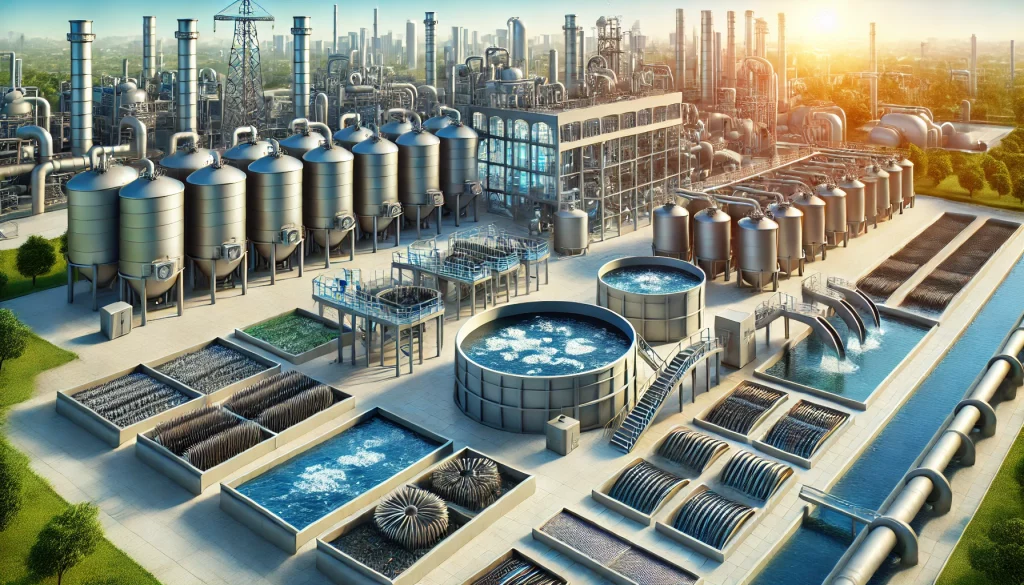In the bustling industrial landscape of Indianapolis, Indiana, effective management of wastewater is paramount. At Waste Water Supply, we understand the critical role that industrial wastewater equipment plays in maintaining a sustainable environment while ensuring operational efficiency. Industrial wastewater equipment encompasses a variety of systems and technologies designed to treat, manage, and recycle wastewater generated by industrial activities. These systems are essential for complying with environmental regulations, protecting public health, and conserving water resources.
Understanding Industrial Wastewater Equipment
Industrial wastewater equipment includes a range of devices and systems, each serving a specific purpose in the treatment and management of wastewater. Key components include:
- Primary Treatment Systems: These systems focus on the removal of large solids and debris from wastewater through processes such as screening and sedimentation. Common equipment includes bar screens, grit chambers, and primary clarifiers.
- Secondary Treatment Systems: After primary treatment, secondary systems are employed to break down organic matter and reduce biological oxygen demand (BOD) using biological processes. This stage often involves aeration tanks, biological reactors, and secondary clarifiers.
- Tertiary Treatment Systems: For industries requiring higher levels of water purity, tertiary treatment is used to remove residual contaminants and nutrients. Equipment in this stage includes sand filters, activated carbon filters, and membrane filtration systems.
- Sludge Treatment and Disposal Systems: The byproducts of wastewater treatment, known as sludge, must be treated and disposed of properly. This process involves sludge thickening, digestion, dewatering, and sometimes incineration.
- Advanced Treatment Systems: These systems address specific contaminants such as heavy metals, pharmaceuticals, and endocrine disruptors. Techniques include advanced oxidation processes (AOPs), ion exchange, and specialized chemical treatments.
Benefits of Industrial Wastewater Equipment
Investing in high-quality industrial wastewater equipment offers numerous benefits for industries, including:
- Regulatory Compliance: Adhering to stringent environmental regulations is crucial for industrial operations. Proper wastewater treatment ensures that discharge meets or exceeds regulatory standards.
- Environmental Protection: Effective wastewater management reduces the release of harmful pollutants into the environment, protecting local ecosystems and water bodies.
- Resource Conservation: Advanced treatment technologies enable the reuse and recycling of treated wastewater, conserving freshwater resources and reducing operational costs.
- Operational Efficiency: Automated and efficient wastewater systems minimize downtime and maintenance requirements, leading to smoother industrial operations.
- Public Health and Safety: Properly treated wastewater mitigates health risks associated with contaminated water, safeguarding the well-being of employees and the community.
Choosing the Right Equipment
Selecting the appropriate industrial wastewater equipment involves considering several factors:
- Industry Type: Different industries generate varying types and volumes of wastewater. The equipment must be tailored to handle the specific contaminants and load characteristics.
- Regulatory Requirements: Understanding local, state, and federal regulations is essential to ensure compliance. Equipment must be capable of meeting these standards consistently.
- Budget and Cost Efficiency: While initial investment is a consideration, long-term operational and maintenance costs should also be factored in. Energy-efficient and low-maintenance systems often provide better value over time.
- Scalability and Flexibility: As industrial operations grow and evolve, wastewater treatment systems should be adaptable to increased volumes and changing waste streams.
- Technology and Innovation: Staying updated with the latest advancements in wastewater treatment technology can provide industries with more efficient and effective solutions.
Examples of Industrial Wastewater Equipment
To provide a clearer understanding, let’s explore some examples of industrial wastewater equipment commonly used in various industries:
- Dissolved Air Flotation (DAF) Systems: Utilized primarily for the removal of suspended solids, oils, and grease from wastewater, DAF systems introduce air bubbles into the water, causing contaminants to float to the surface for easy removal.
- Membrane Bioreactors (MBRs): Combining biological treatment with membrane filtration, MBRs are highly effective in treating high-strength wastewater and producing high-quality effluent suitable for reuse.
- Electrocoagulation Units: These units use electrical currents to destabilize and coagulate contaminants, facilitating their removal from the wastewater. This method is particularly effective for removing heavy metals and colloidal particles.
- Anaerobic Digesters: Commonly used in the food and beverage industry, anaerobic digesters break down organic matter in the absence of oxygen, producing biogas that can be used for energy generation.
- Reverse Osmosis (RO) Systems: RO systems are advanced filtration units that remove dissolved salts, organics, and other contaminants from wastewater, producing high-purity water suitable for various industrial applications.
Maintaining and Optimizing Wastewater Equipment
Regular maintenance and optimization of industrial wastewater equipment are essential to ensure long-term efficiency and reliability. Key practices include:
- Routine Inspections and Servicing: Regularly scheduled inspections and servicing help identify potential issues before they escalate, ensuring the equipment operates at peak performance.
- Operator Training: Well-trained personnel can effectively manage and troubleshoot wastewater systems, reducing the likelihood of operational disruptions.
- Monitoring and Automation: Implementing advanced monitoring and automation technologies allows for real-time data collection and analysis, enabling proactive adjustments to optimize treatment processes.
- Chemical and Biological Additives: Utilizing appropriate chemicals and biological additives can enhance treatment efficiency, improve sludge management, and reduce odor issues.
Conclusion
In the dynamic industrial environment of Indianapolis, Indiana, Waste Water Supply is committed to providing cutting-edge industrial wastewater equipment solutions that meet the diverse needs of modern industries. By investing in advanced treatment technologies and maintaining rigorous operational standards, industries can achieve sustainable wastewater management, comply with regulations, and contribute to a cleaner, healthier environment.
Understanding the intricacies of industrial wastewater equipment, from primary to advanced treatment systems, is crucial for making informed decisions that benefit both the industry and the community. At Waste Water Supply, we are dedicated to supporting industries with reliable, efficient, and environmentally responsible wastewater solutions.
For more information on our range of industrial wastewater equipment and services, feel free to contact our team of experts. Together, we can create a sustainable future for Indianapolis and beyond.

